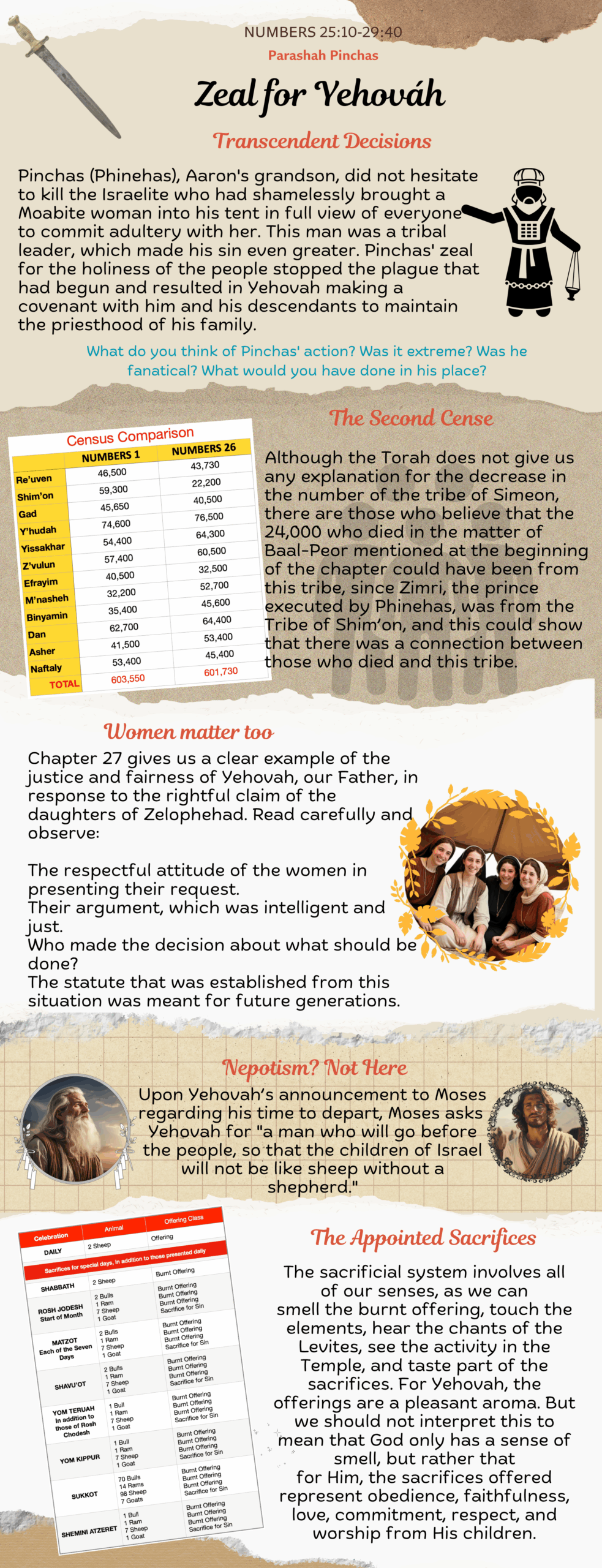Parashah Pinchas
Numbers 25:10 – 29:40
Bilam’s plan had finally succeeded: The men of Yisrael had fallen into the seductive traps of the Moabite women, even going so far as to participate in the idolatrous rites they practiced. In doing so, they had removed themselves from the protection of Yehovah. Now, they themselves would be cursed because of their actions.
The Second Census, conducted in the plains of Moab near Jericho before crossing the Jordan River, allows us to see that the population of Israel had remained stable despite the judgment upon the generation that had left Egypt—those who were over 20 years old at that time. A comparative chart of the two censuses is included.
Another key aspect in this portion of the Torah is Moses’ attitude in asking Yehovah to be the one who appoints his successor. Moses did not seek to have his sons or close relatives take on such a responsibility. This reveals that he was truly a humble man—emptied of self—who sought only the good of Israel while faithfully obeying Yehovah.

About the daily sacrifice
This offering was presented at the beginning of the daylight period—between dawn and the third hour of the day—as the first sacrifice, even though the day had technically begun the evening before. The second sacrifice was presented at the end of the day as the final offering, and thus the sheep remained on the altar as a tamid (תמיד) offering—that is, a continual offering.
In addition, the morning incense had to be offered, and the maintenance of the Menorah lamps carried out: trimming the wicks, refilling the oil containers, and relighting the flames. A grain offering (bread) was also to be brought, along with the libation—the pouring out of oil and wine in the specific quantities required for each sacrifice.
People would attend these services, as testified by the apostles in Acts 3:1, where it is said that Kefa (Peter) and Yochanan (John) went up to the Temple at the hour of prayer, the ninth hour—the time when the afternoon daily sacrifice was offered. It should be noted that the ninth hour corresponds to mid-afternoon, which in our terms would be between 3:00 and 5:00 p.m.
Finally, it’s important to remember that these daily sacrifices were to be offered regardless of any festival being celebrated or even the Shabbat; all other sacrifices or offerings mentioned in this chapter were in addition to the daily ones.
2 Responses
There are numerous messianic hints embedded in the details of these particular sacrifices. Compare the time that Yeshua died, the length of time He was tortured and suffered, and the moment He died. It’s a shame that more people in our modern era refuse to read these passages because they are “boring.” “God uses the foolish things of this world to shame the wise.” Keep remembering that sentence when you search for evidence of Messiah and His reality.
Thank you for the comparison census chart, great visual. And good point about Shim’on. I noticed the significant uptick in the tribe of M’nasheh and I wonder if it could have been that they received blessings for the Daughters of Zelophehad’s bold Faith.
🙂